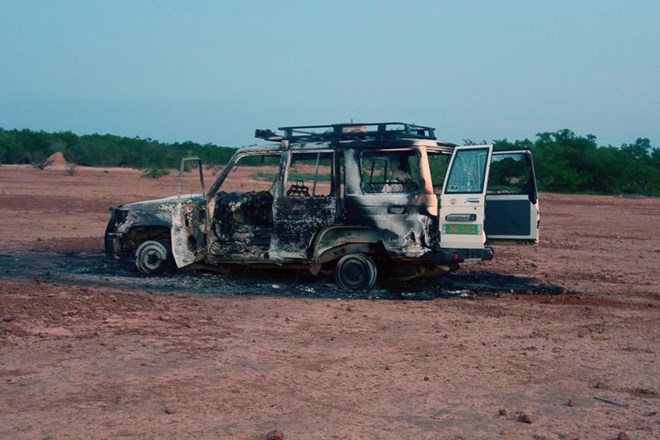
By Antony Sguazzin
Wednesday February 8, 2023

The wreckage of the car where aid workers, their local guide and the driver were killed by unidentified gunmen in Niger in 2020. Photographer: Boureima Hama/AFP/Getty Images
The inability of states to provide basic services and security and create jobs across much of Africa, ranging from the Sahel zone in the west to Somalia in the east and Mozambique in the south has made the continent the global epicenter of extremist violence, the United Nations Development Programme said.
In 2021 sub-Sahara Africa accounted for 48% of all deaths from violent extremism and 21% of attacks, the UNDP said in its Journey to Extremism in Africa report released Tuesday. A third of those deaths were in just four countries — Somalia, Burkina Faso, Niger and Mali. Between 2011 and 2020 more than 50,000 people died as result of extremist violence on the continent.
“In the absence of the state institution providing for the basic services of, you know, security, rule of law or functioning courts, people essentially turn to these violent extremist groups,” Achim Steiner, administrator of the UNDP, said in an interview. “They provide in whichever form an alternative.”
While the spread of extremist groups is creating mounting problems for Africa, with deaths from terrorism rising tenfold in the Sahel since 2007 and economic costs between 2007 and 2016 estimated at $97 billion, the collapse of state services in countries such as Burkina Faso and Somalia threatens the world.
“We are at a point where development is imploding and the conditions that actually drive violent extremism are growing exponentially,” Steiner said. “More and more people are actually, you know, trying to get out of their own country that they call home.”
In addition to migration, both to developed countries and overburdened neighboring states, letting extremist groups flourish could see them export the violence globally, as had happened with Osama bin Laden in Afghanistan, he said.
The UNDP report was based on interviews over two years with 2,196 people, three time as many as in a 2017 study carried out by the program. Of those, 1,000 were former members of violent extremist groups, some of whom were forcibly recruited and others who joined voluntarily.
Recruitment factors included a lack of education, isolation and the brutality of government forces. Most of those interviewed were former members of Boko Haram in Nigeria, al-Shabaab in Somalia and Jama’a Nusrat ul-Islam wa al-Muslimin, or JNIM, the al-Qaeda-affiliated coalition in West Africa.
Platform, NarrativeStill, while the majority of the extremist groups focused on in the study are Islamists, religion is a secondary factor, providing a “platform and also a narrative,” Steiner said. If more money was directed to development rather than fighting extremists, with sub-Saharan military expenditures amounting to $20.1 billion in 2021, fewer people would be pushed into extremist groups, the UNDP said in the report.
Already the economic impact of the violence can be seen. Much of northern Nigeria, Mali and Burkina Faso are inaccessible because of the security threat and TotalEnergies SE has halted a $20 billion natural gas project in Mozambique after an attack by Islamist militants.
“We need to have a much more fundamental reflection on what is working, what is not working,” Steiner said. “These essentially nation state collapses that we are witnessing are ultimately going to have a cancer-like effect on, on not only neighboring countries, but ultimately the global sense of human security.”
(Updates with desire for security in first paragraph)